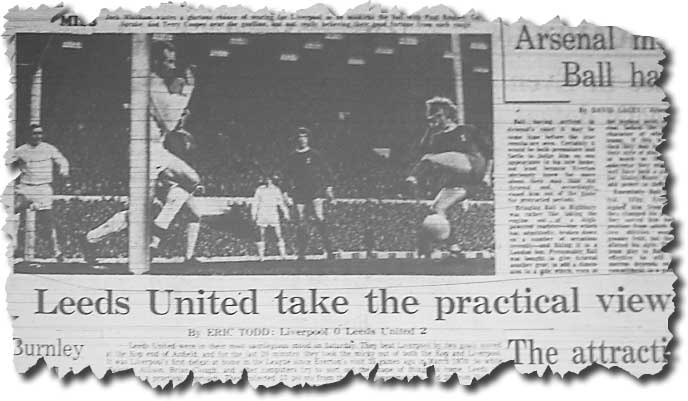 Part
1 - Exiles - Part 2 - The Asa Hartford affair
- Results and table
Part
1 - Exiles - Part 2 - The Asa Hartford affair
- Results and table
New Year's Day, 1972, saw Leeds United third in the First
Division table, four points behind leaders Manchester United, and facing
a clash with old rivals Liverpool at Anfield. The Reds were defending
an unbeaten home record that stretched back 34 League games to March 1970.
Leeds secured an admirable 2-0 victory with a sterling display.
Jack Charlton's absence with a
neck injury created few issues, only providing Paul Madeley with the opportunity
to offer further evidence of his outstanding versatility, while Johnny
Giles and Billy Bremner brought direction and purpose to United's midfield
play.
Eric Todd in The Guardian: 'During the past six years
every adjective - not all of them complimentary - has been bestowed on
Leeds United. I still believe that dedicated and imperturbable are the
most apposite. Against Liverpool they played to a predetermined plan,
and the manner in which they withstood Liverpool's first half assaults
was so much a hallmark of their coolness and method as it was a warning
of the wrath to come.'
Liverpool failed to seize the day, passing up the opportunity
to exploit United's defensive mindset in the first period. Leeds threatened
just once, when Lorimer hammered the ball against Clemence's upright from
25 yards. There was more action at the other end, with Sprake saving well
from Hughes and Keegan, the latter also striking a post. When Whitham
had an open goal yawning, Reaney was perfectly placed to preserve the
clean sheet.
Nevertheless, it was United who opened the scoring after
58 minutes. Giles played a free kick out wide to Madeley on the right
and when he nodded across goal, Clarke flicked the ball home cleverly
with his head. The Whites wrapped up the points with ten minutes remaining.
Lorimer crashed into a tackle deep on the Leeds right and, with the Reds
pleading for a free kick, Clarke broke away to pierce the Liverpool defence
with a killer pass for Jones to steer into the bottom corner.
Leeds' gathering momentum was stayed a week later as they
stuttered to a 2-2 draw at home to Ipswich. The visitors took a shock
two-goal lead on the hour when Allan Clarke's older brother Frank nodded
home from a corner.
United responded sharply and pulled one goal back two minutes
later from a Bremner header. A controversial score with six minutes to
go brought them level. Terry Brindle in the Yorkshire Post: 'With
Leeds piling irresistible pressure on the Ipswich goal, Allan Clarke stabbed
in an angled shot which hit Best, rebounded and was booted away by Morris.
The referee, Mr Jack Taylor, signalled a goal, was mobbed by protesting
Ipswich players, and stuck to his guns after brief consultation with a
linesman.
'Was it a goal? "Of course," said Mr Taylor. "I
was standing only about three yards away, and the ball was a foot over
the line when it hit the goalkeeper. No doubt whatsoever." "Of
course," said the Leeds players and manager Don Revie, who was six
inches surer than Mr Taylor. "It was 18 inches over the line,"
he said.
;When Ipswich had taken a two-goal lead through Allan Hunter
and Frank Clarke - totally against the run of play and probability - it
seemed Leeds were destined for unheard of defeat. But their profound character
won through. The pressure was redoubled to unbearable intensity, the resolve
never wavered and Ipswich finally capitulated.
back to top
'Leeds wasted more chances than they should; they conceded
two soft goals and turned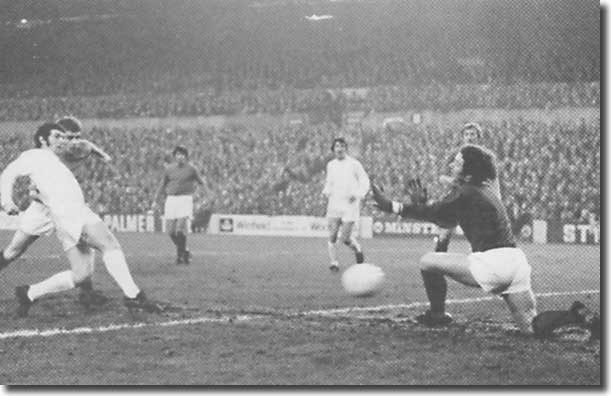 a virtual formality into an uphill slog. But they fought through brilliantly
to a point and that is still championship form.'
a virtual formality into an uphill slog. But they fought through brilliantly
to a point and that is still championship form.'
At the club's annual general meeting during the week that
followed, Don Revie warned that United
might have to reconcile themselves to a lean spell during a period of
rebuilding. He suggested they needed to replace three or four world class
players in the next few years. Praising the directors for having 'backed
me to the hilt', Revie said that if he wanted a player tomorrow, the directors
would put their hands into their pockets. 'But if you are going to pay
big fees, I feel you must try and be certain that you are going to receive
good service over a ten-year period. That means buying players of about
21 or 22.'
The FA Cup third round brought Bristol Rovers to Elland
Road on 15 January. United were without strikers Clarke and Jones, along
with Charlton, but they won 4-1 with two goals apiece from Giles and Lorimer.
They took the lead after 17 minutes and were 3-0 up at the break in their
first FA Cup-tie since losing at Colchester
in February 1971.
Third Division Rovers showed plenty of courage and spirit,
but were badly outclassed on the day. Giles gave United the lead after
17 minutes, slotting home the rebound after goalkeeper Jack Sheppard failed
to hold a Lorimer shot. The Scot added a second goal six minutes later,
taking the ball wide of the keeper and avoiding two tackles before scoring
off a post. Giles made it 3-0 from the spot in the 34th minute after Sheppard
brought Lorimer down. Sandy Allan got Rovers on the score sheet thanks
to a defensive lapse after 74 minutes, but the Whites remained in complete
control, adding a fourth and final goal eight minutes from time when Lorimer
notched his second.
A couple of days later, reserve keeper David Harvey revealed
his desire to come off the transfer list after 11 months.
It was reported that, when his current contract ended in
the summer, Harvey would sign a new three-year contract with a three-year
option. 'I suppose people will think it is money which has caused me to
change my mind, but that is not so. I have said all along that I would
accept a drop in wages if I went to an ambitious club. Money is not everything
… I want to be involved the whole time, and lately I have enjoyed going
to report on other teams for the boss. In fact, one of the things which
has helped me greatly in reaching this decision was a promise that I can
continue with this sort of work when I am not playing.
'I have worked hard at my game at Leeds and now that I shall
be spending the rest of my playing career with United I intend to settle
down and try to work even harder.'
'It is great news for myself and the club,' said Don Revie.
'I never wanted David to leave Elland Road and we only put him on the
list in the first place because he wanted to try to break through at another
club. I must say that I was surprised he was not snapped up by some club
or other but all that is in the past now as far as I am concerned.'
Harvey's place on the list was taken by one of his colleagues:
John Faulkner.
Eight weeks later the defender was sold to Luton Town for
£6,000, ending a disappointing stay at Elland Road. He conceded an own
goal on his debut against Burnley in April 1970, and fractured a kneecap
in his second appearance a fortnight later. Faulkner made his comeback
at the end of September 1971 in the Fairs Cup against Lierse, playing
in both legs. Those four games were the sum total of his two years at
Leeds. His time at Luton was more impressive, with over 200 first team
appearances and a place in their promotion-winning side in 1974.
Jones and Clarke were restored to the line up against Sheffield
United on 22 January, and the latter headed the only goal after 16 minutes.
With table toppers Manchester United losing at home to Chelsea, the win
took Leeds top for the first time.
It was not, however, a high quality contest, as reported
by Richard Ulyatt in the Yorkshire Post: 'It was hard, unyielding
and sluggish; a test of players' strength and referee's patience. Get
on with the game, never mind the ball, might well have been the day's
order. The gem of a shot Gray made for Leeds and Hope saved for Sheffield;
the astute move by Scullion which nearly provided an equalising goal;
even the winning goal, scored by Clarke in the 16th minute with a header
from Jones' splendid cross after he and Madeley had shrugged off a succession
of challenges, were minor, almost incidental, excitements.
back to top
'What dominated the day was the crunch of boot on bone,
expected or felt, fair or illegal, and the determination of the admirable
referee, Mr Keith Walker, to stand no nonsense. He said as much in the
first minute when booking Bremner for a foul on Salmons. He said so again
a few minutes later when booking Salmons for fouling Lorimer. He said
so when booking 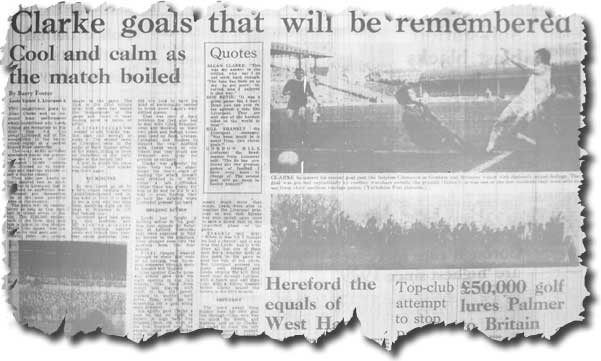 Hockey
for fouling Bremner and was even more emphatic when sending off Salmons
and then, before the player had started walking, having second thoughts.
"I told the player," Mr Walker said afterwards, "that next
time he would go and I was influenced in my decision not to send him off
by Bremner appealing to me on his behalf." Bremner, be it said, was
the man fouled.
Hockey
for fouling Bremner and was even more emphatic when sending off Salmons
and then, before the player had started walking, having second thoughts.
"I told the player," Mr Walker said afterwards, "that next
time he would go and I was influenced in my decision not to send him off
by Bremner appealing to me on his behalf." Bremner, be it said, was
the man fouled.
'I reckon Mr Walker was the hero of the piece. He ought
to have given a penalty against Sheffield when Jones was pushed by Colquhoun,
but from an angle different from mine it might have looked more obstruction.
He might have sent Salmons off, but full marks to him for having second
thoughts.'
Again, as United looked to build on their advantage, they
experienced a setback, losing at Tottenham on 29 January. It was their
first defeat since Southampton on 13 November.
The only goal at White Hart Lane came when Peter Lorimer
sold Gary Sprake short with a loose back pass after 71 minutes. The keeper
seemed to have saved the day, but let the ball slip away off his legs
as he came out and Martin Chivers seized on the opportunity to score.
Leeds could have done with an easy game to allow them to
regain momentum, but the following week they faced Liverpool
at Anfield in the FA Cup fourth round. They secured a goalless draw
to take the Reds back to Elland Road for a midweek replay.
A miners' strike had caused coal shortages, so the match
was scheduled for a 2.30 kick off to avoid the need for floodlights. Nevertheless,
45,821 fans were on hand to watch United
win by virtue of two brilliant goals from Allan Clarke.
The Whites had to be content with a goalless draw at Everton
on 12 February, but with Derby and Manchester United both losing and Manchester
City held to a 3-3 draw at Sheffield United, their progress was not overly
hampered.
Fears that their challenge might stall were emphatically
dispelled over the next few weeks as Leeds enjoyed one of the most impressive
periods in the club's entire history.
On 19 February Manchester
United visited Elland Road, and were battered 5-1; a week later Leeds
won at Cardiff in the FA Cup far more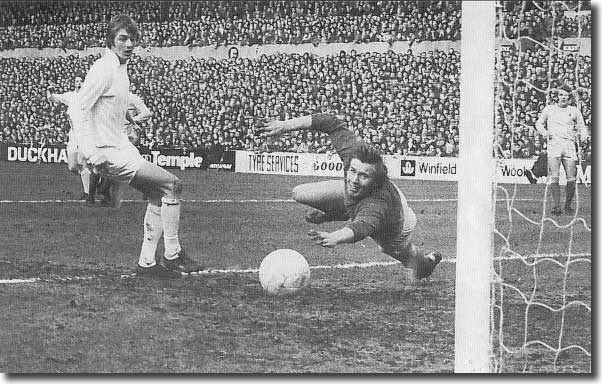 decisively than the 2-0 scoreline suggests; next came the
legendary 7-0 humiliation of Southampton. This was the stuff of dreams
for Revie.
decisively than the 2-0 scoreline suggests; next came the
legendary 7-0 humiliation of Southampton. This was the stuff of dreams
for Revie.
The Daily Telegraph: 'Leeds, with their breathtaking
efficiency, left no doubt about the sheer quality of their football ...
Leeds, as manager Don Revie has claimed, had more than a passing resemblance
to Real Madrid in their prime.' Rob Bagchi and Paul Rogerson in The
Unforgiven: 'It was a supreme moment. Eleven years after he'd made
the decision to switch the club strip to all white in homage to Real Madrid,
Revie had finally received the one compliment he had always desired.'
Coventry City attempted to spoil the party on 11 March,
setting up a defensive wall to hold back the tide at Elland Road. They
escaped with a 1-0 defeat, undone by a goal from a defender celebrating
a magnificent milestone.
Paul Fitzpatrick in The Guardian: 'Before the game
Jack Charlton, who has laboured with distinction for Leeds for 20 years,
was presented with a wall clock, a six-piece set of furniture and any
amount of silverware to mark his six hundredth League game for the club.
Soon, at the club's expense, his house will be decorated throughout. Fortunately
for Leeds, he was still not satisfied. After 10 minutes Charlton, who
until then had been largely idle, went on an almost inquisitive visit
into the Coventry penalty area, and scored with a well-timed, well-placed
header from Madeley's accurate centre. Charlton, in spite of the room
he was given, has not scored many better goals. It could yet prove to
be one of the most important in this season's League race.
back to top
'If Charlton saved the game for Leeds, a high wind ruined
it for the spectators … It could not be blamed, however, for an undercurrent
of sourness which ran through the game after the goal, which itself had
its origins in crime - an unpleasant foul by St John on Clarke. Thereafter,
an indecisive referee failed to maintain strict discipline. And when Mr
Challis did dish out a caution, most people felt that the booking had
arrived at least half an hour too late.
'Coventry were the chief sinners, with Cattlin, Smith, Blockley
and Barry earning the wrath of the home crowd. Leeds were largely but
not entirely blameless, 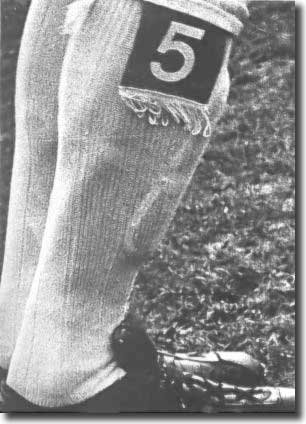 and
Reaney was guilty of the worst foul of the afternoon. Lucky for him that
at the time the referee's attention was elsewhere.
and
Reaney was guilty of the worst foul of the afternoon. Lucky for him that
at the time the referee's attention was elsewhere.
'The compensations for missing collective brilliance were
some excellent individual performances. In the Leeds defence … Charlton
and especially Hunter were outstanding. Hunter never has been, probably
never will be, an endearing character, but he is playing wonderful football
at present, and his reading of this game was so perceptive as to be almost
clairvoyant. Giles was magnificent, an unrivalled master of midfield and
unrivalled as the game's outstanding player.'
United's transformation that spring was evident in many
more features than merely their onfield performance. Bagchi and Rogerson:
'Revie had become commercially involved with Paul Trevillion, a football
illustrator and budding inventor. Persuaded that the best team in the
country were not getting the plaudits they deserved, he accepted Trevillion's
suggestion that, by adopting a few gimmicks to bypass the press and whip
up the hysteria of the public, United could quickly reverse the years
of negative publicity.
'In short, the project was the full scale marketing of the
team ... It involved madcap but funny schemes like the pre-match salute,
the sock tags, group warm up callisthenics, culminating in the choreographed
kicking of plastic footballs into the crowd. Strangely, it worked. The
most memorable part was the salute. The team would run out of the tunnel
two minutes before their opponents, giving the crowd ample opportunity
to barrack the visitors when they appeared shortly afterwards. The players
would then form a line either side of the centre spot and salute each
part of the ground in turn, milking the applause. Trevillion had special
tracksuits made, with each player's surname embroidered on the back. After
the match the players would throw their number-bearing, autographed sock
tags ... into the crowd.'
The pre-match routine was given its first airing before
the FA Cup quarter-final with Tottenham
on 18 March. There was some snide carping about the gimmickry, but
no one could dispute the breathtaking quality of United's football. In
another peerless display they destroyed Tottenham, though the 2-1 scoreline
masked the one sidedness of the game.
The disappointing return from away games continued with
another goalless draw at Leicester. A poor performance owed something
to 'a bone hard, bare, uneven pitch which made my lawn look like a bowling
green' (according to Mike Casey in the Evening Post).
Back in the familiar surroundings of Elland Road, against
reigning champions Arsenal on 25 March, United were back to their
best. They tore the Gunners apart, goals from Clarke, Jones and Lorimer
delivering a 3-0 lead at the break, which they were content to preserve.
Two days later, United destroyed relegation-haunted
Nottingham Forest by six goals to one.
The victory brought Leeds within two points of Manchester
City, with a game still in hand.
Narrow victories the following day for Derby and an increasingly-consistent
Liverpool tightened the most widely and hotly contested title race for
years, as the top four enjoyed clear water on the rest of the field.
| |
Top of Division One - 27 March, 1972 |
| |
Pos
|
|
P
|
W
|
D
|
L
|
F
|
A
|
Pts
|
| |
1st
|
Manchester
City |
35
|
20
|
10
|
5
|
66
|
36
|
50
|
| |
2nd
|
Leeds
United |
34
|
20
|
8
|
6
|
61
|
23
|
48
|
| |
3rd
|
Derby
County |
34
|
19
|
9
|
6
|
58
|
30
|
47
|
| |
4th
|
Liverpool |
34
|
18
|
8
|
8
|
50
|
27
|
44
|
| |
5th
|
Wolverhampton
W |
34
|
15
|
11
|
8
|
57
|
47
|
41
|
| |
|
|
|
|
|
|
|
|
|
Leeds dropped a point at West Ham on Good Friday, 31 March,
coming back from 2-0 down to snatch a draw with two second half goals
from Eddie Gray.
Geoffrey Green in The Times: 'Leeds United, without
Giles and Jones and with Lorimer on one leg for most of the second half,
not so much lost a point at Upton Park yesterday as rescued one. Yet the
hard fact remains that they can scarcely afford anything but victory now.
Be that as it may, however, the Yorkshiremen at the interval were two
down to goals by Bond and Hurst and looking bereft. But in a spirited
second half they rallied with terrier spirit to save their ship.
'The absence of Giles yesterday seemed all important. He
is the pocket Napoleon of the Leeds side and without him Bremner looked
like someone mourning the loss of an arm. Gray, fit again and switched
inside from the wing to take Giles' place, more than did his part by scoring
both the Leeds goals in the second half. But somehow one had the feeling
that here was a committee lacking a dominating chairman.
'A swift shot by Bonds after only four minutes and a left
foot arrow by Hurst from Robson's precise cross put West Ham in the ascendancy.
But a couple of fine double barrelled replies by Gray, right and left
foot, in the second half brought things to an even keel.'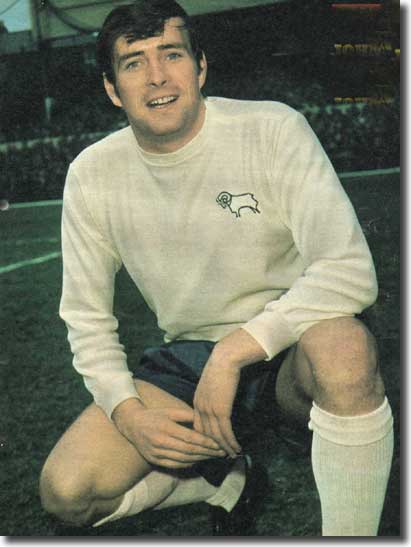
back to top
While Giles was fit to return, Jones was still unavailable
to play the following day at third placed Derby County. Don Revie reported
the following list of casualties: Charlton (bruised thigh), Reaney (ankle),
Lorimer (bruised knee), Clarke (bruised shin), Bates (bruised hip), Bremner
(double vision), Gray (blisters), Madeley (blisters). In the end all eight
were fit to play, with Bates substitute. The others in the eleven were
Sprake, Cooper and Hunter.
A crowd of almost 40,000 witnessed a memorable contest,
though United had one of their poorer afternoons, understandably so, given
the crippling demands of having to play two vital games within the space
of twenty-four hours.
Barry Foster in the Yorkshire Post: '(Derby's) whirlwind
football was much too much for Leeds United on Saturday in the big match
of the day. After their energy-sapping uphill fight for a point the previous
day at West Ham, Leeds were no match for a fresh and fine Derby outfit
who, in the end, beat them as convincingly as they themselves had beaten
Derby at Elland Road on Boxing Day.
'Derby never allowed Leeds to settle on the ball and play
the game at their pace. It is a formula that has beaten Leeds before but
one should quickly add Derby backed up their pressure with a great depth
of skill and ideas. It was easy to see why Don Revie ... was full of praise
for the Derby performance, adding that if his team did not take the title
Derby would.
'There was a goal in each half, the first from O'Hare's
head after 16 minutes and the second as a result of his hard shooting
in the 70th minute. The Scottish international, making his 200th League
appearance for Derby, hit Sprake's leg with his shot for the second and
in the best tradition of Leeds Driffield, the ball cannoned from the goalkeeper
to Norman Hunter and then into the net.
'But when you add that Reaney twice managed to clear fierce
shots off the goal line and Hunter, a gallant competitor and one of the
few who did not deserve to be on the losing side, also made a goal line
clearance, the difference between the two sides is even clearer.
'It should not be forgotten, however, that Leeds did get
the ball in the net first. Giles, back in the side after injury, though
never looking near his true form, found the net after 10 minutes but was
marginally offside. To their credit the Leeds players took the decision
without complaint but thereafter managed only one shot - again from Giles
- to trouble Boulton.
'Right from the first kick the match was played at a fast
and furious rate. Within five minutes McGovern had been booked after Giles
had been brought down on the slippy pitch. In the next five minutes Giles
had put the ball in the net at one end and Reaney had been stunned by
heading a drive from Gemmill off the line at the other.
'The first goal came after Bremner had been pressured into
a poor clearance, the ball going straight to Durban whose cross was too
accurate for either Sprake or Cooper to stop O'Hare. With Todd looking
better in the back four than Moore had done the previous day, and Leeds
missing the power of the injured Jones, there was no reply from Leeds.'
| |
Top of Division One - 1 April, 1972 |
| |
Pos
|
|
P
|
W
|
D
|
L
|
F
|
A
|
Pts
|
| |
1st
|
Derby
County |
36
|
21
|
9
|
6
|
61
|
30
|
51
|
| |
2nd
|
Manchester
City |
36
|
20
|
10
|
6
|
67
|
38
|
50
|
| |
3rd
|
Leeds
United |
36
|
20
|
9
|
7
|
63
|
27
|
49
|
| |
4th
|
Liverpool |
36
|
20
|
8
|
8
|
54
|
24
|
49
|
| |
5th
|
Tottenham
H |
36
|
16
|
11
|
9
|
52
|
36
|
43
|
| |
|
|
|
|
|
|
|
|
|
The victory took Derby top; with Manchester City losing
at home to Stoke and Liverpool beating West Bromwich, the clubs remained
tightly bunched.
Easter Monday saw Derby slump to a surprise defeat at home
to Newcastle while Liverpool won 3-0 at Old Trafford, easing Leeds down
to fourth.
back to top
Liverpool manager Bill Shankly: 'The side to lift the title
will be the one that gets consistent results over the remaining five-six
matches. We have never said that we would win the League - only that it
was not all over, by a long way.'
Manchester City's 2-0 reverse at Southampton the following
day dented their diminishing hopes and on Wednesday, 5 April, Leeds and
Derby had an opportunity to strengthen their claims, with United at home
to Huddersfield and Derby at West Bromwich.
The Rams had to be content with a goalless draw, but a hesitant
United beat Huddersfield 3-1. Leeds, playing before 46,148 supporters,
took the lead after twenty minutes when Jones headed home a Lorimer cross
after the Scot had dummied his way past left-back Hutt.
The Terriers looked the more assured in midfield, despite
having to contend with their own anxieties regarding relegation. They
equalised ten minutes after the break when Smith's header went into the
net off Hunter.
However, it was Leeds who won, with two goals in the final
13 minutes. Lorimer took Giles' pass to drive a powerful shot into the
corner of the net from the sharpest of angles; five minutes later Jones
put Gray free at midway and he glided through to score the third after
beating Clarke and slipping the ball wide of goalkeeper Pierce.
A 3-0 victory at Stoke on 8 April was just what the doctor
ordered, with two goals from Jones and a third from Lorimer, his 28th
of the campaign. But Leeds paid a terrible price for the points, with
Terry Cooper fracturing his left leg five minutes from the end. The same
afternoon, Nigel Davey suffered a double
fracture of his right leg while playing for the reserves.
Don Revie: 'Neither of them will play again this season
... It is not a time to drop our heads, we have a job of work to do.'
The injury at least solved a headache for the manager: how
to keep Paul Reaney happy. The England international had been in and out
of the side since Eddie Gray was recalled in November, with Paul Madeley
generally preferred at right-back. Cooper's unavailability left Madeley
the obvious choice at No 3, allowing Reaney to resume his long-running
monopoly of the right side of the defence.
Gary Sprake was also out of contention after injuring a
knee at Huddersfield, which allowed another player recently taken off
the transfer list, David Harvey, to stake a claim. Reaney and Harvey were
both in the eleven which faced Second
Division Birmingham City in the FA Cup semi final at Hillsborough on 15
April. Both men, in fact, played unchanged to the very end of the
campaign.
United were heavily fancied to beat the Blues and did so
with assurance. Jones opened the scoring after 16 minutes, Lorimer added
a second eight minutes later and Jones wrapped up a 3-0 victory with his
second in the 64th minute. It was as straightforward as the score suggested.
United were through to their third Cup final in eight seasons.
During the week, Leeds wasted one of their games in hand,
going down to an 81st-minute goal from Malcolm Macdonald at Newcastle.
It was desperately disappointing. Don Revie: 'This defeat really throws
the championship wide open. We must win our three remaining games to keep
the pressure on. I thought there was a blatant penalty for us when Moncur
pulled Jones' shirt to hold him back in the box.'
Four days later, United repaired some of the damage when
a Giles penalty earned two points at West Bromwich. 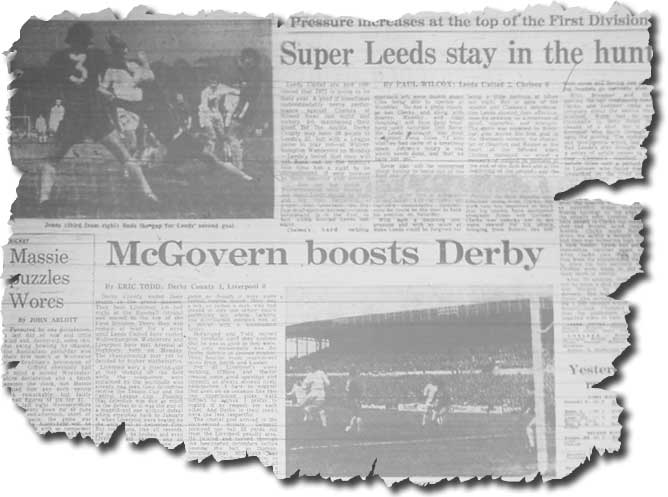 Liverpool
beat Ipswich 2-0 at Anfield, while the top two clashed, with Manchester
City defeating Derby 2-0. It was City's final game and left them top,
but the other three contenders had games to play and superior goal averages.
The destiny of the championship was still anyone's guess.
Liverpool
beat Ipswich 2-0 at Anfield, while the top two clashed, with Manchester
City defeating Derby 2-0. It was City's final game and left them top,
but the other three contenders had games to play and superior goal averages.
The destiny of the championship was still anyone's guess.
None of the four contenders were in action on 29 April,
when England faced West Germany at Wembley in the European Championship.
Norman Hunter and Paul Madeley were in a side beaten 3-1 thanks to the
performance of a lifetime from midfielder Gunter Netzer.
Monday, 1 May, brought two vital clashes, with Derby entertaining
Liverpool and Leeds at home to Chelsea. It was a night which seemed certain
to be decisive.
back to top
The first meaningful event of the night came after 20 minutes
at Elland Road, where Billy Bremner gave his side the lead. Norman Fox
in The Times: 'Clarke had almost scored at least twice before he
contributed the crucial pass in the move that gave Leeds their first goal.
This was no ordinary move, it was a sequence of attacks that pummelled
the Chelsea goalmouth until the right gap appeared. Nearly a dozen passes
had flicked from man to man in front of Bonetti as he looked from one
side of the penalty area to the other like an umpire at tennis. Then came
Giles to simplify things with a ball struck through the area to Clarke
to the right of goal. Clarke's instantly judged and executed pass across
the crowded goal area was met on the run by Bremner, who hammered his
shot past the bemused Bonetti.
'There were times last night when Leeds deserved every trophy,
medal and accolade that they have been begrudged so often by Fate. Their
superiority over this good Chelsea team was so remarkable that they could
play possession football after only 20 minutes. Passes clicked into place
like jigsaw parts.'
At the midway point United were in control and cruising
to a win, despite their slender one-goal advantage. Over in the East Midlands,
the contest remained scoreless.
20 minutes after the resumption, Derby skipper John McGovern
followed the United captain's example, putting his team ahead. Geoffrey
Green, also in The Times: 'Gemmill turned back and forth two or
three times like a rabbit trying to escape the headlights of a car. Suddenly
he cut back for the third time, squared a pass across the face of the
penalty area and there was McGovern suddenly free and able to pick his
spot at the top corner past Clemence's desperate dive.'
Minutes later, Leeds settled the destination of the points.
Norman Fox: 'A corner from Giles went low to Lorimer who drove a shot
into the blue wall. Inevitably, the ball rebounded and Jones moved sideways
to find room, turned and found a tiny target to Bonetti's left. As Leeds
ran back, congratulating each other on this important goal, they heard
that Derby were winning. The whole ground seemed to boil over with excitement.
The Double was in sight.'
| |
Top of Division One - 1 May, 1972 |
| |
Pos
|
|
P
|
W
|
D
|
L
|
F
|
A
|
Pts
|
| |
1st
|
Derby
County |
42
|
24
|
10
|
8
|
69
|
33
|
58
|
| |
2nd
|
Leeds
United |
41
|
24
|
9
|
8
|
72
|
29
|
57
|
| |
3rd
|
Manchester
City |
42
|
23
|
11
|
8
|
77
|
45
|
57
|
| |
4th
|
Liverpool |
41
|
24
|
8
|
9
|
64
|
30
|
56
|
| |
|
|
|
|
|
|
|
|
|
There were no further goals and Leeds and Derby confirmed
their victories, with Liverpool dropping their first points since 11 March.
Don Revie was finally forced to admit, 'I think we have a chance of the
Double now.'
Liverpool and United each had one game left, on the Monday
following Leeds' Cup final date with Arsenal on 6 May. But that would
have to wait for the time being ...
The Cup final was punctuated by incidents that remain vivid
in the memory of the United fan: Jones committing McNab, hurdling his
challenge and sending over an inviting centre; Clarke plunging headlong
to send the ball looping past goalkeeper Barnett into the bottom corner;
Bremner receiving the trophy from the Queen; and Hunter helping the injured
Jones up the stairs to the Royal Box to collect his medal.
LEEDS HAD WON THE CUP!
They had precious little opportunity to relish their moment
of triumph, however, for they were off to Wolverhampton on the second
stage of their pursuit of the Cup and league Double.
The equation was simple; United required only a draw at
Molineux to win the title. An 11-0 victory for Liverpool at Highbury against
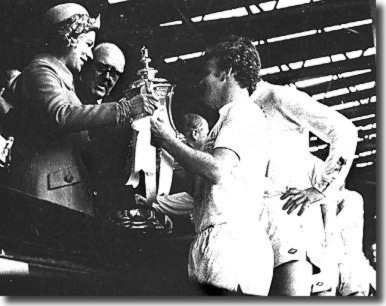 Arsenal
would then be required to deny them. Should Leeds lose and Liverpool win,
then Bill Shankly's men would scoop the championship.
Arsenal
would then be required to deny them. Should Leeds lose and Liverpool win,
then Bill Shankly's men would scoop the championship.
There was a third option, but it was just too remote, too
convoluted, a notion to be given serious credence in pre-match discussions:
if Leeds lost and Liverpool failed to win, Derby would be champions. It
was so slim a possibility that even County had dismissed it and departed
on their holidays, the players to Majorca and manager Brian Clough to
the Scilly Isles.
Astonishingly, it was exactly that permutation of events
that transpired: Wolves rose dramatically
to the challenge on a passionate evening in the West Midlands and
won 2-1 with Don Revie bemoaning the penalties his men were denied; in
London, Liverpool could not pierce the Arsenal defence and were held to
a 0-0 draw.
back to top
DERBY HAD WON THE TITLE!
A third successive runners-up finish was almost too much
to bear for Revie. Jack Charlton, 'celebrating' his 37th birthday, summed
it up succinctly: 'I am sick as a pig.'
Richard Ulyatt had followed United for the Yorkshire
Post for two decades. Under the headline of 'An unforgettable season
for Leeds', he summed up a remarkable campaign.
'One might have thought that Leeds United had, like Huddersfield
Town, been relegated, or like Sheffield Wednesday, were floundering in
the middle of the Second Division. Or indeed, one might have thought that
they were like any one of the other Yorkshire clubs who have not exactly
set the Humber alight. One certainly would not imagine that Leeds United
had won the Cup, had finished second in the First Division table, had
gained more friends in the world of soccer than in any year of the last
decade and had done more in one season than most clubs do in a lifetime.
'Not since Manchester United's first match after the Munich
air disaster in 1958 had I seen or heard so much emotional euphoria directed
to the team as that which greeted Leeds United's appearance on the pitch
at Molineux. One might have thought they were the home team and Wolverhampton
Wanderers the visitors.
'Leeds United, despite what some of their supporters expected
on Monday, have had an outstanding season, one of the most exceptional
in the history of professional football. They have taken criticism, injury,
adverse publicity, and occupational hazards such as strange refereeing
decisions in their stride. They have been, once or twice, on the point
of being down and out, but they have bounced back and now they have, by
winning the Cup, finally arrived at the point when they must be acknowledged
as among the leading clubs in the history of professional football.
'But if Leeds United had not won a sausage ... this would
have been a memorable season for the quality of the football they played.
There were 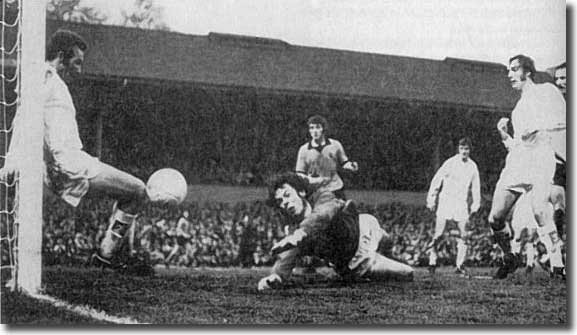 times
when I saw them play better than any other team in the long years I have
been watching soccer.
times
when I saw them play better than any other team in the long years I have
been watching soccer.
'Leeds United ... have become one of the outstanding groups
in the history of football. There are times when I wish they did not protest
as much, there are times when they are not prepared to take the rough
with the smooth, there are times when they ought to count ten and consider
that what they do schoolboys all over the country are likely to copy.
'I am sure that lesson is sinking in. The punishment the
club received when the ground was closed for a month at the start of the
season may, in the final assessment, be considered to have cost them the
championship, but the way they set about establishing themselves as leader
in their field of sport was wholly admirable.
'Leeds as a city has every reason to be proud of Leeds United
and there is no doubt that in these times when elsewhere in the county
there are more kicks than ha'pence for professional footballers, the rest
of Yorkshire looks at with some envy and not a little admiration. Congratulations,
Leeds United, drink deep from your Cup.'
Ulyatt was right, of course, for it is clear that Leeds
United in the spring of 1972 were at the zenith of their powers, the COMPLETE
team, coming perilously close to perfection.
For the moment, though, they needed to wallow in self pity,
to dream of what might have been. That was only natural. But the summer
months would dull the pain and allow them to reflect objectively on how
much they had achieved.
Truly, this was SUPER LEEDS, a team to be remembered and
revered in the years to come.
Part 1 - Exiles - Part
2 - The Asa Hartford affair - Results
and table
back to top
Other Football Highlights from 1971/72
- Celtic had a mixed season in Scotland. They surprisingly crashed 4-1
to tiny Partick Thistle in the Scottish League Cup final and lost on
penalties to Inter Milan in the European Cup semi finals, but they won
the league and Cup Double for the second successive year. It was their
seventh successive league title
- Non-league Hereford United had a memorable Cup triumph at home against
First Division Newcastle United in a third round replay with Radford
and George (not the Arsenal pair) scoring the goals. Hereford went on
to draw with West Ham in the next round before going out in a replay
and were then elected to the Football League, taking the place of Barrow
- Tommy Docherty was appointed Scotland manager on 12 September
- Rangers won the Cup Winners' Cup by beating Moscow Dynamo in Barcelona
but had their victory celebrations spoilt by their supporters' after
match behaviour. UEFA banned the club from European competition for
two years (subsequently reduced to one year). After their triumph, manager
Willie Waddell was moved to a general management role and his assistant
Jock Wallace took over team affairs. He immediately sold Colin Stein
and Willie Johnston to Coventry City and WBA for £225,000, declaring:
'We have sold two stars and found a team.'
- At the start of the season, the FA instructed referees to take a hard
line on players tackling from behind, but the move caused chaos - in
the first week of the season four players were sent off and 120 booked.
On September 4 alone 50 players were booked, taking the total to 292
after four weeks. The PFA protested and there were season long disputes
about the problem
- Chelsea beat Jeunesse Hautcharage by a record 21-0 on aggregate in
the Cup Winners Cup, including a 13-0 win at Stamford Bridge. Peter
Osgood broke another record by scoring eight goals in the tie
- England reached the European Championship quarter finals comfortably
enough but were thrashed 3-1 by West Germany in the first leg at Wembley
by West Germany, with midfielder Gunter Netzer and sweeper Franz Beckenbauer
in scintillating form. A 0-0 second leg draw in Berlin saw England's
exit. The Germans went on to beat the USSR 3-0 in the final to win their
first title
- Tottenham won the UEFA Cup to put alongside the Cup Winners' Cup they
won in 1963, thus becoming the first British team to win two different
European trophies. They beat Wolves 3-2 over the two legs
- Stoke City were one of the oldest teams in the league but in their
lengthy history they had never been to Wembley. But they won the League
Cup by beating Chelsea 2-1 in the final. 34-year-old Gordon Banks and
35-year-old George Eastham, who scored the Wembley winner, were two
of the veterans who pulled off a very popular triumph
- Ted Macdougall scored a record nine goals as Bournemouth beat Southern
League Margate 11-0 in the FA Cup first round. He also finished the
season as joint leading scorer in the league with 35 goals












 Part
1 - Exiles - Part 2 - The Asa Hartford affair
- Results and table
Part
1 - Exiles - Part 2 - The Asa Hartford affair
- Results and table
 a virtual formality into an uphill slog. But they fought through brilliantly
to a point and that is still championship form.'
a virtual formality into an uphill slog. But they fought through brilliantly
to a point and that is still championship form.' Hockey
for fouling Bremner and was even more emphatic when sending off Salmons
and then, before the player had started walking, having second thoughts.
"I told the player," Mr Walker said afterwards, "that next
time he would go and I was influenced in my decision not to send him off
by Bremner appealing to me on his behalf." Bremner, be it said, was
the man fouled.
Hockey
for fouling Bremner and was even more emphatic when sending off Salmons
and then, before the player had started walking, having second thoughts.
"I told the player," Mr Walker said afterwards, "that next
time he would go and I was influenced in my decision not to send him off
by Bremner appealing to me on his behalf." Bremner, be it said, was
the man fouled. decisively than the 2-0 scoreline suggests; next came the
legendary 7-0 humiliation of Southampton. This was the stuff of dreams
for Revie.
decisively than the 2-0 scoreline suggests; next came the
legendary 7-0 humiliation of Southampton. This was the stuff of dreams
for Revie. and
Reaney was guilty of the worst foul of the afternoon. Lucky for him that
at the time the referee's attention was elsewhere.
and
Reaney was guilty of the worst foul of the afternoon. Lucky for him that
at the time the referee's attention was elsewhere.
 Liverpool
beat Ipswich 2-0 at Anfield, while the top two clashed, with Manchester
City defeating Derby 2-0. It was City's final game and left them top,
but the other three contenders had games to play and superior goal averages.
The destiny of the championship was still anyone's guess.
Liverpool
beat Ipswich 2-0 at Anfield, while the top two clashed, with Manchester
City defeating Derby 2-0. It was City's final game and left them top,
but the other three contenders had games to play and superior goal averages.
The destiny of the championship was still anyone's guess. Arsenal
would then be required to deny them. Should Leeds lose and Liverpool win,
then Bill Shankly's men would scoop the championship.
Arsenal
would then be required to deny them. Should Leeds lose and Liverpool win,
then Bill Shankly's men would scoop the championship. times
when I saw them play better than any other team in the long years I have
been watching soccer.
times
when I saw them play better than any other team in the long years I have
been watching soccer.